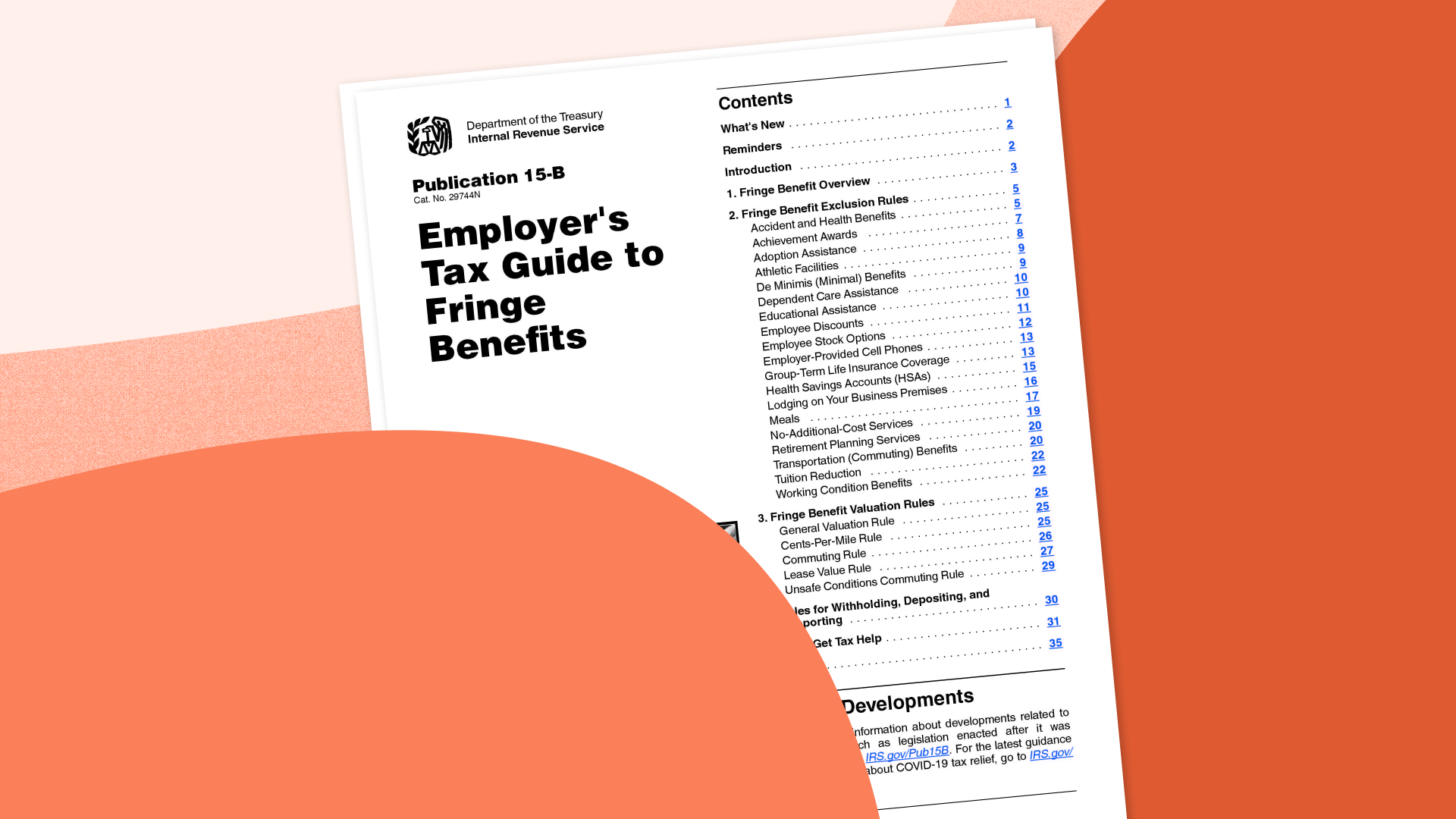Understanding Small Business Tax Deductions
Common Tax Deductible Items for Small Businesses
Home Office Deduction
Employee Expenses
Professional Fees and Education
Advertising and Marketing Costs
Deducting Business Losses
Keeping Accurate Records
How Justworks Can Help
Tax time can be stressful for small business owners, but there’s good news: with a solid understanding of small business tax deductions, you could save money. Every dollar counts, especially when you're running a business. Taking advantage of every eligible deduction is an essential strategy for maximizing your business's profitability, allowing you to allocate more resources towards innovation and expansion.
In this guide, we’ll walk through how to identify deductible expenses, the most common deductions to take advantage of, and how to stay organized. Let’s dive in!
Understanding Small Business Tax Deductions
Tax deductions reduce your taxable income, lowering the amount of tax you owe. For small business owners, this means more money in your pocket to grow your business. To qualify as a deduction, an expense must be both ordinary (common in your industry) and necessary (helpful in generating income). This doesn’t mean every single expense is deductible, but knowing what is and what isn't can help you make informed decisions and save money at tax time.
It’s important to differentiate between a tax deduction and a tax credit. While deductions lower your taxable income, credits reduce the actual amount of tax owed, making them even more powerful. However, deductions are more common and widely applicable, especially in the context of small business operations. Familiarizing yourself with these distinctions and the specific deductions available to your business is crucial for optimizing your tax strategy.
Ordinary and Necessary Expenses
The IRS defines ordinary expenses as those that are common and accepted in your trade or business, while necessary expenses are those that are helpful and appropriate for your business. It's important to ensure your expenses meet these criteria to qualify for tax deductions. Misclassification can lead to complications or potential audits, so clarity and accuracy in categorizing expenses are vital.
Ordinary and necessary expenses can vary widely depending on your industry. For example, what is considered ordinary for a tech startup might differ from a retail business. Understanding the nuances of your specific industry standards can provide further clarity on what expenses can be effectively leveraged as deductions. Engaging with industry-specific resources or communities can offer additional insights and best practices.
Common Tax Deductible Items for Small Businesses
To get the most out of your tax deductions, it helps to know what types of expenses you can deduct. Keeping detailed records and receipts to backup your claims is a must. Planning ahead and keeping your records organized make it much easier to get through tax season smoothly and save more money in the process.
Knowing which expenses you can deduct isn’t just good for staying compliant—it can also improve your overall financial strategy. By spotting possible deductions early on, you can budget more effectively throughout the year. This approach can mean big savings and more funds to reinvest in your business.
Office Supplies
Everyday office items like pens, paper, and ink cartridges are all tax-deductible, even if you work from home. Just make sure these expenses are directly related to your business, and keep those receipts organized.
Keeping a running list of your office supplies and receipts can make it easier to stay on top of what you’re spending. Doing a regular check of your inventory will also help you stay stocked up on essentials and prevent you from buying too much or too little.
Business Meals
If you’re meeting clients over lunch or discussing business at dinner, you can typically deduct 50% of those meal expenses. Just make sure the meal has a business purpose, and keep a record of the details, including the date, place, and who you were with.
To stay organized, you might want to set up a policy around business meals, like setting budget guidelines and creating a process for tracking them. Using a business credit card for meals is also a good idea, as it makes tracking expenses a lot simpler.
Travel Expenses
When traveling for business, you can deduct the costs of flights, hotels, rental cars, and meals. Just keep clear records of where you went, why it was for business, and other details to support your claim. Being able to clearly separate business from personal travel is key.
Setting up a travel policy can be helpful, too—it keeps everyone on the same page about what counts as a deductible expense. Using travel management tools can also streamline tracking and make sure you don’t miss any receipts or details along the way.
Vehicle Expenses
If you use a vehicle for business, you can deduct related costs. You have two options: you can use the standard mileage rate or go with the actual expenses method. The mileage rate is straightforward, while actual expenses require more detailed records but can mean a bigger deduction if you often travel for work.
Choosing the best method depends on how often you use the vehicle for business. If you’re logging a lot of miles, the actual expense method might give you a bigger deduction. For those with lighter business vehicle use, the standard mileage rate could be simpler and still save you money.
Home Office Deduction
If you work from home, the home office deduction can be a big win. To qualify, the space you claim must be used regularly and exclusively for business. You have two options: a simplified deduction based on square footage or an actual expense deduction that includes a portion of your utilities, rent, and maintenance costs. The home office deduction applies whether you own or rent, so it's worth exploring if you operate from a home office!
Understanding the eligibility criteria is crucial to leveraging this deduction without attracting undue scrutiny. Ensure your home office setup complies with IRS requirements, and maintain clear documentation to support your claim. This includes floor plans, photographs, and detailed records of expenses related to your home office.
Employee Expenses
If you have employees, certain expenses related to their employment are tax-deductible. These can include salaries, wages, bonuses, and employee benefits such as health insurance and retirement plans. Properly managing these expenses can lead to significant tax savings and improve employee satisfaction.
Offering competitive benefits not only aids in attracting and retaining talent but also provides tax advantages. Understanding the tax implications of different employee benefits can help you design a cost-effective and attractive compensation package. Consulting with a tax professional can ensure you’re fully leveraging these deductions while staying compliant with employment laws.
Professional Fees and Education
Fees paid to accountants, lawyers, or other professionals for business-related services are deductible. Additionally, expenses related to continuing education and training that improve your business skills may also be deductible. Investing in professional services and education not only enhances your business capabilities but also reduces your tax burden.
Staying informed about industry trends and advancements is crucial for maintaining a competitive edge. Deductions for professional fees and education can offset the cost of these essential investments. Regularly evaluating the effectiveness and necessity of these services and programs can help you align them with your business goals and maximize their tax benefits.
Advertising and Marketing Costs
The costs associated with promoting your business, such as advertising, marketing materials, and website expenses, are generally tax-deductible. This includes everything from online advertising to printed brochures and business cards. Strategic marketing not only drives business growth but also offers tax relief.
Tracking and analyzing the ROI of your advertising and marketing efforts can help ensure you are making the most of these deductions. Regularly reviewing and adjusting your marketing tactics will allow you to maintain a dynamic and cost-effective approach.
Deducting Business Losses
Sometimes, businesses operate at a loss, especially in their early years. A net operating loss (NOL) occurs when your deductions exceed your income. You can use an NOL to offset other income in some tax years, which can result in lower taxes. This can be a strategic way to reduce tax liability when things don’t go as planned. But note that there are rules on how and when you can carry forward these losses, so working with a tax professional can help maximize this strategy.
Utilizing an NOL can offer a buffer against fluctuating income and unexpected downturns. It’s essential to understand the rules and carryover provisions associated with NOLs, as they can provide valuable tax relief over multiple years. Engaging with a tax advisor can ensure you’re navigating these complexities correctly and maximizing the benefits available to you.
Keeping Accurate Records
Good record-keeping is the foundation of maximizing your deductions. Keeping accurate records of your expenses not only saves you stress at tax time but also ensures you’re claiming everything you’re entitled to. Use apps or software to track expenses, save receipts, and categorize spending. This makes tax time much easier and helps if you ever need to prove your claims.
Organized records not only facilitate smooth tax filing but also provide valuable insights into your business's financial health. By regularly reviewing your records, you can identify trends, manage cash flow better, and make informed business decisions.
Tips for Record-Keeping
Consistent Tracking: Regularly update your records to avoid end-of-year stress. This practice helps maintain accuracy and ensures you capture all deductible expenses.
Separate Accounts: Use separate bank and credit card accounts for business expenses to simplify tracking. This separation makes it easier to distinguish between personal and business transactions, minimizing errors.
Digital Receipts: Consider using apps or software to store digital copies of receipts, reducing clutter and making records easy to access. Digital storage enhances organization and provides quick retrieval of documents when needed.
How Justworks Can Help
If your business has employees, Justworks can take on the administrative burden of employee-related tasks and ensure that you don’t miss deductions related to employee wages, benefits, and payroll taxes. With careful planning and organization, you can make the most of your small business tax deductions and support the growth of your business. A proactive approach to tax management not only enhances your financial standing but also positions your business for long-term success. Get started with Justworks today!
Check out our newsletter
Monthly tips on running a business in your inbox.
Check out our newsletter

Learn more with Justworks’ Resources
Scale your business and build your team — no matter which way it grows. Access the tools, perks, and resources to help you stay compliant and grow in all 50 states.






